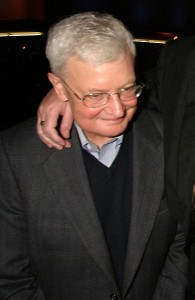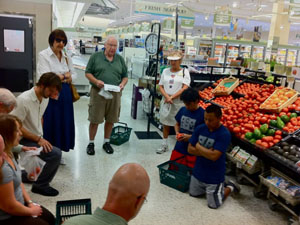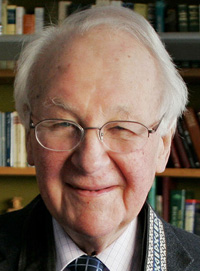Spirituality
 "I have no interest in megachurches with jocular millionaire pastors," Ebert writes. "I think what happens in them is sociopolitical, not spiritual. I believe the prosperity gospel tries to pass through the eye of the needle. I believe it is easier for a Republican to pass through the eye of a needle than for a camel to get into heaven. I have no patience for churches that evangelize aggressively.
"I have no interest in megachurches with jocular millionaire pastors," Ebert writes. "I think what happens in them is sociopolitical, not spiritual. I believe the prosperity gospel tries to pass through the eye of the needle. I believe it is easier for a Republican to pass through the eye of a needle than for a camel to get into heaven. I have no patience for churches that evangelize aggressively.
"I have no interest in being instructed in what I must do to be saved. I prefer vertical prayers, directed up toward heaven, rather than horizontal prayers, directed sideways toward me," he continued. "If we are to love our neighbors as ourselves, we must regard their beliefs with the same respect our own deserve."
And I'll be your new tour guide here at God's Politics.
Some of you may know me by my more official byline, Cathleen Falsani. I've been a contributing editor and columnist for Sojourners Magazine for several years now, writing a column every other month called "Godstuff" and also have contributed from time to time to this'a'here blog.
 Could my mission really be confined to seeking the best for the children to whom I gave birth? Or, as a Christian, should I define "family" more broadly? I'd see images of women and children suffering around the world, and those puzzling verses returned to my mind. Maybe, instead of obsessing over the happiness of my babies, I should stick my head out of the window, so to speak, look around, and ask, "Who is my family?"
Could my mission really be confined to seeking the best for the children to whom I gave birth? Or, as a Christian, should I define "family" more broadly? I'd see images of women and children suffering around the world, and those puzzling verses returned to my mind. Maybe, instead of obsessing over the happiness of my babies, I should stick my head out of the window, so to speak, look around, and ask, "Who is my family?"
It didn't feel right to simply shrug my shoulders and blithely accept my good fortune as compared to that of people born into extreme poverty. I'd buy my kids their new school clothes and shoes and then think of mothers who did not have the resources to provide their children with even one meal a day. I'd wonder: what's the connection between us? Does the fact that $10 malaria nets in African countries save whole families have anything to do with my family buying a new flat-screen TV? Should it? Is there any connection between me, a suburban, middle class mom, and women around the world?
Each moment is pregnant with new possibilities waiting to be born, alive with new beginnings, God's secrets not yet heard, God's dreams not yet fulfilled. These were the thoughts that lodged in my mind as I meditated on Isaiah 48:6-8 this morning. So many good Christian people I talk to are afraid that their prayer life will become stale, their spiritual disciplines empty rituals. Some make this an excuse for their lack of discipline in prayer. And prayer does become stale and meaningless if we don't know how to stir our imaginations and awaken our creativity to new thoughts, new patterns and new possibilities for prayer.
Tools for prayer are creative opportunities not formulae for success
One of my greatest fears as I continue to share these tools for prayers is that some of my readers will see them as another formula that will make them more successful and more prayerful. Of course that is possible, but what I hope is that we will all see these as tools as ways to stir our imaginations and open our minds to new ways to express the prayers God has placed in our hearts, stimuli that awaken our creativity to the brand new possibilities of ways that God can speak to us, in us, and through us.
In reading some of the responses to my last post Embodied Theology, I was reminded of an essay I wrote for a class last semester, so I've rewritten part of it as a blog post to help clarify my position.
Embodied theology is rooted in the doctrine of creation. Why did God create us? As some have proposed, God couldn't not create or love us -- it's just part of God's nature. As a relational giver and lover within the Trinity, God couldn't help but be the same thing in relation with humanity. Who we are comes from God. We are not by nature sinful broken creatures, but creatures shaped in the very image of God.
Yesterday afternoon I found out that ABC news plans to dedicate it programming today to "Hunger at Home: Crisis in America." It precipitated my writing of this post which I had planned to add as a later addition to a series on tools for prayer.
One important item in our prayer toolkit is knowledge of our hurting world. Not knowledge for the sake of knowledge, but knowledge that equips us to respond. Becoming aware of the needs in our world can lead us into a deeper understanding of the ache in God's heart for our hurting friends and neighbors. It can also connect us to our own self-centered indifference that often makes us complacent when God wants us to be involved. And it can stimulate us to respond to situations that we once felt indifferent to.
 To the farmers who grow our food, the harvesters who pick it, the transporters who bring it to market, the grocers who present it, and the cooks who prepare it.
To the farmers who grow our food, the harvesters who pick it, the transporters who bring it to market, the grocers who present it, and the cooks who prepare it.
Here's the prayer we prayed at a nearby Publix grocery in the produce section on Friday:
A Prayer for Publix
Living God, you are the Creator of this beautiful and fertile world. You made sun, rain, soil, air, seed, and seasons. We praise you for the green of lettuce, the yellow of lemon, the orange of a tangerine, and especially for the bright red of a tomato. They are beautiful to our eyes, delicious to our taste buds, and nourishing to our bodies. We pray to the Lord, Lord, hear our prayer.
About two years ago, Minhee and I made one of the hardest decisions we've made thus far in our marriage and in our calling as parents.
In our hope to honor a conviction of the Holy Spirit to give up a year's salary, we had begun the two-year process of saving, selling, and simplifying in 2007. Our goal was to come up with our then year's wages of $68,000 -- in order to launch One Day's Wages. With only a few months left to come up with the total sum, we were a bit short and decided to sublet our home for couple months and asked some friends if we could stay with them on their couches or their guest room.
Needless to say, it was a very humbling time.
Our instruction for ourselves and our children were very simple: Each person gets one carry-on bag for their belongings.
Earlier this summer I attended a church service where the pastor, a man struggling with what appears to be his final bout with cancer, preached about the hope that Jesus promises to those who trust in him. After describing the returning Jesus brandishing a sword and dripping with the blood of all our vanquished enemies, he invited the audience to share what they saw as the hope that this Jesus promises. The responses ranged from no cancer, to no pain, to no worries about paying the bills, to the promise of an upgraded body -- all of course in heaven someday after we die. The congregation was encouraged to find contentment in the present from the possibility of realizing these promises someday. Our souls are what matter; the body just has to endure until our souls reach heaven. No mention of help with how to pay this month's rent or what it means for a cancer-ridden body to be the temple of the Holy Spirit, just the spiritual promise that someday all will be well.
Rev. Steve Stone was just trying to be a good neighbor.
Two years ago, the pastor of Heartsong Church in Cordova, Tennessee, on the outskirts of Memphis, learned that a local mosque had bought property right across the street from the church. So he decided some Southern hospitality was in order.
A few days later, a sign appeared in front of the church. "Heartsong Church welcomes Memphis Islamic Center to the neighborhood," it read.
That small act of kindness was the start of an unlikely friendship between the two congregations, one that made headlines around the world. Members of the mosque and church have shared meals together, worked at a homeless shelter, and become friends over the past two years. When Stone learned that his Muslim friends needed a place to pray for Ramadan because their building wasn't ready, he opened up the doors of the church and let them hold Ramadan prayers there.
The Lord called Samuel again, a third time. And he got up and went to Eli, and said, 'Here I am, for you called me.' Then Eli perceived that the Lord was calling the boy. 9Therefore Eli said to Samuel, 'Go, lie down; and if he calls you, you shall say, "Speak, Lord, for your servant is listening." (1 Samuel 3.8-9)
I am in a profession where the term "call" is used frequently. When used as a verb, "call" is about feeling that tug between you and God toward something that at first may not seem practical, desirable, or even expected. When used as a noun, "call" can be synonymous to a job, occupation, ministry, or church -- hence the term "seeking a call."
For me, "seeking a call" simply means trying to figure out what to do next. And lately this task has felt like an impossible mission. I have always admired -- or if I'm to be honest, jealous of -- those that seem to have a clear sense of their calling. Take my husband for example, he feels very called to be a pastor. Although there are times when he struggles with the type of church or ministry he feels called to serve, he has certainty that his call is that of a pastor. I wish that was the case for me. I have always felt called to a place, such as seminary or my current congregation, but I have never felt confirmation or an affinity to my call as a pastor. This may not make sense or may seem odd, but welcome to my life.
I have always loved the story of Samuel being called.
In recent days I've been thinking through with a friend one of the enduring challenges of pastoral and catechetical ministry: how to dispel the notion that worship should be entertaining. It's not as hard as it used to be -- there are books (and blogs) on the subject; it gets preached on fairly often these days. But it's not as easy as it ought to be. It seems we are a species ever in need of amusement.
One of the most compelling arguments against the persistent idea that worship ought to entertain, dazzle, distract, or otherwise charm us is found in James Alison's insight that true worship is "orchestrated detox."
It's Jesus walking on the water Sunday here at House for All Sinners and Saints, and we thought maybe during "Open Space" we should have a kiddie pool set up in the back so you could all "test your faith." You know -- go ahead and give it the old Christian try. That's how I've always heard this story preached: like it's the "Little Engine Who Could Have." As a matter of fact, here's a one-minute version of the sermon I just don't have the stomach to preach to you
In his seminal 1974 book Models of the Church, theologian Avery Dulles offered five paradigms, or "models," each of which called attention to certain aspects of the worldwide Christian church. The church, Dulles wrote, is in essence a mystery -- a reality of which we cannot speak directly. Thus we must draw on analogies to understand the church in deeper ways.
Dulles developed five models, drawing on a range of theological schools and traditions, both Protestant and Catholic, to illuminate different aspects of the church. His models included church as institution, mystical communion, sacrament, herald, and servant. Dulles was careful to point out that no single model, by itself, adequately paints a complete picture of the church; each contains important insights about the nature of the church.
I have gotten so used to stories of violence in the news every morning that I confess they don't move me as much as they should, or used to. Today: Three straight days of killing in Karachi with 42 dead; Syrian tanks shelling the city of Hama, where more than 100 people have died since Sunday; U.N. peacekeepers killed by a landmine in Sudan; daily deaths in Libya; bombings in Baghdad and assassinations in Kandahar. It goes on and on.
John Stott died this Wednesday. He was 90 years old. What many people don't understand is that he was the most influential 20th-century evangelical leader in the world, with the exception of Billy Graham. Stott became the Anglican rector of All Souls Church in downtown London at the age of 29 in 1950, and he stayed there for his entire ministry. But from his parish at Langham Place in the city's West End, and right across from BBC headquarters, John Stott spoke to the world with 50 books that sold 8 million copies. He also traveled the globe , speaking, teaching, convening, mentoring, and bird watching -- a personal passion.
Perhaps the most telling thing about this man is all the personal stories about "Uncle John" that the world is now hearing, from many Christian leaders around the world who were profoundly influenced, encouraged, and supported by John Stott. And secondly, how such a giant in the Christian world remained so humble, as testified to by those who knew him who say how "Christ-like" he was.
 [Editors' note: Rev. John Stott, one of the world's most influential evangelical figures over the past half-century, died this Wednesday at age 90. Rev. Stott served as a contributing editor for Sojourners magazine, when we were known as The Post American, and wrote this article for the November/December, 1973 issue of the magazine. We will always remember Rev. Stott for his profound contributions to our community and the Church.]
[Editors' note: Rev. John Stott, one of the world's most influential evangelical figures over the past half-century, died this Wednesday at age 90. Rev. Stott served as a contributing editor for Sojourners magazine, when we were known as The Post American, and wrote this article for the November/December, 1973 issue of the magazine. We will always remember Rev. Stott for his profound contributions to our community and the Church.]
It seems to be a characteristic of the Anglo-Saxon mind to enjoy inhabiting the "polar regions" of truth. If we could straddle both poles simultaneously, we would exhibit a healthy balance. Instead, we tend to "polarize". We push some of our brothers to one pole, while keeping the other as our own preserve.
What I am thinking of now is not so much questions of theology as questions of temperament, and in particular the tension between the "conservative" and the "radical."
